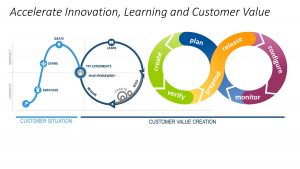
DevOps is the solution that focuses on the right and faster delivery of the IT service. It is developed with a combination of tools and practices. It improves collaboration across the entire IT department, and makes the deployment process faster. DevOps came into existence to bring the system administrator, test engineer, business user, and others on the same page to achieve the delivery of the optimized software aligned with the user’s requirements. The collaborative ambiance set up by the DevOps helps in the right development process and approach. It further helps the team to identify and fix the errors at the right time.
And, the most important question, why DevOps came into the picture?
To meet customer’s expectations.
As, seen in the above image, DevOps is entirely focused on customer situation and customer value creation.
How do DevOps work?
DevOps aligns well with the Agile software development. The goal of this solution is to reduce the life cycle of the software development.
The tools in DevOps are the source code repository, configuration management, build server, test automation, virtual infrastructure, configuration management, combining delivery and enterprise software development, pipeline orchestration, etc.
The solution relies explicitly on the automation. The work process it follows is:

- Plan: Here, the planning of the next phase, such as the repetition of the process in product development is checked.
- The next is the code building
- Deployment and testing
- Product updates
- Checking the performance of the software
- Collecting the feedback of the customer
What are the benefits of DevOps?
- Delivery: This is one of the significant benefits which an organization can get. The rapid delivery of the solution, gives an organization the right time to improvise the product, thus having a competitive advantage in the market.
- Security: The solution provides one of the best security without comprising on the already existing security.
- Reliability: The solution has the reliability feature, thus ensuring the updates of the application are done the right way.
- Innovation: DevOps helps organizations in the innovation process by accelerating the process, thus driving the right business results.
- Collaboration: The solution helps in the right collaboration process between the developers and teams working in other departments.
- Business profits: It accelerates the business profits by delivering the software at the targeted time.
- The satisfaction rate of customer: It improves the customer satisfaction exponentially
- Complexity: Has less complexity in managing
- Engagement process: Right engagement of the employee leading to better productivity
- Stability: DevOps provides a stable environment for a smooth operation process.
- Excellent communication process: With the right collaboration, it also improves the communication approach.
The main principles of DevOps:
- Continual optimization process: It follows a continuous optimization process. It thus reduces the cost and time in the process of development.
- Customer satisfaction: DevOps came into existence, keeping customers in mind, so it entirely focuses on how to provide a better customer experience. The solution thus adds value to the business in the process.
- Teamwork: With DevOps, organizations could have the right teamwork to achieve the objective.
- End-to-End process: The team thus takes the responsibility of delivering the high-quality product into the market.
- Testing: Continuous improvement makes the right product. The team regularly tests it for delivering the best version.
Which are the organizations that use DevOps?
- Amazon
- Adobe
- NASA
- Netflix
Limitations of DevOps:
- Adoption of the DevOps technology into the process of organization is challenging in a short time frame.
- Development with the DevOps is expensive for the organization to invest in.
- Limited knowledge in DevOps could be a problem in the right integration of the automation.
Conclusion:
DevOps is highly essential as the process helps in the unified approach to reaching the target. It streamlines the approach resulting in an effective and efficient process.
The culture created by DevOps makes organizations more productive by removing the barriers between the development and support teams. The approach capitalizes on the expertise of the team, to garner the right results. Increasing the efficiency with the combined effort of various teams in the development, testing, and IT infrastructure departments makes DevOps successful.

